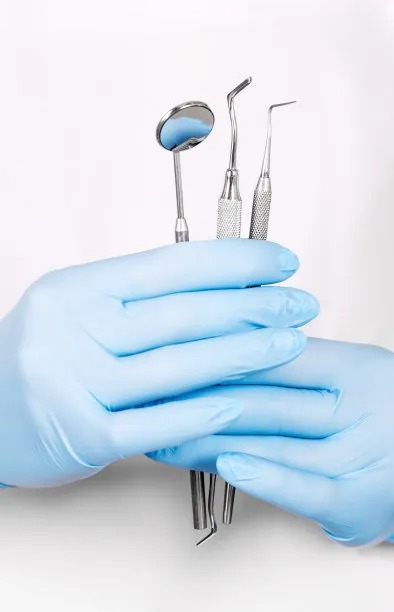Summary: Dental filling treatments are essential for restoring the functionality and aesthetics of teeth affected by cavities or trauma. However, proper precautions before and after the treatment can significantly influence the healing process and overall oral health. This article outlines key precautions to take, focusing on preparation, aftercare, dietary considerations, and regular follow-ups. By adhering to these guidelines, patients can optimize their dental filling experience, ensuring longevity and effectiveness of the fillings while maintaining overall oral hygiene.
1. Preparing for Dental Filling Treatments

Preparation is crucial for ensuring a smooth dental filling procedure. Before heading to the clinic, make a list of any symptoms you are experiencing and any medications you are currently taking. This information will help your dentist tailor the treatment to your personal health needs. Being clear about your dental history can also expedite the process and minimize complications during treatment.
Additionally, patients should arrange transportation after the procedure. Depending on the type of anesthesia used, you may feel groggy or impaired. Having someone available to drive you home allows you to rest and recover without the added stress of navigating traffic. Proper planning is key to ensuring a comfortable experience post-treatment.
Lastly, ensure that you maintain good oral hygiene leading up to your appointment. Brush and floss your teeth thoroughly to minimize bacterial presence in your mouth, thereby contributing to a cleaner environment for the filling procedure. By taking these measures, you set the stage for a successful treatment.
2. Aftercare for Dental Fillings
After receiving a dental filling, it is vital to adhere to proper aftercare practices. Avoid consuming hard or crunchy foods for at least 24 hours following the treatment, as this can disturb the filling and lead to unnecessary discomfort. Opt for soft foods that require less chewing to protect the newly filled area.
Moreover, refrain from using tobacco or engaging in smoking activities, as these can hinder the healing process. Nicotine can constrict blood vessels, slowing down recovery and increasing the risk of complications such as infection. Prioritizing oral health in the immediate days following your treatment is crucial for optimal results.
Pain management is another key aspect of aftercare. It is common to experience some discomfort post-treatment; however, over-the-counter pain relievers can effectively manage this. Always follow the medication guidelines provided by your dentist, and do not hesitate to reach out if the pain becomes severe or persistent.
3. Dietary Considerations Post-Treatment
Your diet plays a significant role in the healing process after dental filling treatments. For the first few days, focus on consuming a balanced diet rich in nutrients and vitamins. Soft foods such as yogurt, mashed potatoes, and smoothies can provide necessary sustenance without straining the teeth.
In the weeks following the filling, it is advisable to avoid sticky or excessively sweet foods. Such items can not only jeopardize the integrity of the filling but can also create an environment conducive to plaque buildup and cavities in surrounding teeth. Maintaining a careful dietary approach is essential during this recovery period.
Additionally, hydration should not be neglected. Drink plenty of water, which helps rinse away food particles and bacteria, thus minimizing the risk of infection. Keep in mind that while certain foods should be avoided, eating nutritious meals can enhance overall recovery and oral health.
4. Importance of Regular Dental Check-ups
Regular dental check-ups are crucial for maintaining optimal oral health, especially after a dental filling. Schedule appointments with your dentist at least twice a year to monitor your fillings and ensure they are functioning properly. During these visits, your dentist will assess the health of your teeth and gums, helping to catch any potential issues early.
Furthermore, professional cleanings during these check-ups can help prevent any buildup of plaque and tartar that could negatively impact your fillings or lead to new cavities. A clean mouth is integral to the longevity of dental treatments, ensuring your fillings remain intact.
Lastly, maintain an open line of communication with your dentist regarding any concerns that arise post-treatment. Whether its sensitivity to hot or cold temperatures or any visible changes around the filling, addressing these issues promptly can prevent further complications and ensure your continued oral health.
Summary:
In summary, taking essential precautions before and after dental filling treatments is paramount for ensuring optimal oral health. From preparation and aftercare to dietary adjustments and regular dental visits, each step contributes to the effectiveness and longevity of dental fillings. By being proactive, you can enhance the overall experience of dental treatment while safeguarding your oral health for the long term.
This article is compiled by Vickong Dental and the content is for reference only.
Vickong Dental
Vickong Dental is a large medical group established in Hong Kong in 2008 by professors from well-known medical universities in Guangdong and Hong Kong, as well as medical doctors from key national '985' universities (including Master's supervisors and senior professors). The chain of branches brings together expert dentists with PhDs and Master's degrees from Hong Kong and Mainland China, committed to providing high-quality dental treatment.
"Vickong Dental Practices the University Motto of 'Healing and Serving Society,' with a Stable Operation for Sixteen Years. It Has Been honored with Hong Kong Enterprise Leaders's Choice,' and is a Global Trusted Implant Center for the Nobel Implant System. Recommended by Hong Kong Metro Broadcast and Guangdong Television, it Serves Customers from Over Thirty Countries and Regions, Gaining the Trust and Favor of Citizens from the Guangdong-Hong Kong-Macau Greater Bay Area and Surrounding Cities.

Thousands of customers' unanimous praise
The most recognized and highly recommended dental service by customers in the Guangdong-Hong Kong-Macau Greater Bay Area
We Ensure You Receive Detailed Care and Attention Here
Hong Kong standards, Shenzhen prices, Your Trusted English-speaking dentists

Vickong Dental Medical-Grade Instrument Disinfection Process
Vickong Dental Medical-Grade Instrument Disinfection Process

Vickong Dental Chain: A Warm and Comfortable Environment for Treatment






Appointment Hours

Q&A
Why choose Vickong Dental?
Vickong Dental practices the university motto 「Medicine to Benefit Society」, with each branch bringing together highly qualified dentists with doctoral and master’s degrees from Hong Kong and the Mainland, and has maintained seventeen years of steady operation。Recipient of 「2024 Hong Kong Enterprise Leaders Brand」, 「2025 Hong Kong Enterprise Leaders Brand」, a Nobel Biocare Global Trusted Implant Center, and a brand recommended by Metro Radio Hong Kong and Guangdong TV。
To date, we have served customers from more than thirty countries and regions,earning exceptionally high word-of-mouth recognition and trusted recommendations from residents across the Guangdong-Hong Kong-Macao Greater Bay Area and surrounding cities
We have eight major branches in Zhuhai、Shenzhen,and a consultation and service assurance center in Hong Kong,so you can book a free consultation at any time for any questions,which is very reassuring.
If I do not accept the quotation after the CT scan, will I be charged??
No! As long as the actual treatment has not started, you will not be charged any fees.
Will there be any additional charges during the treatment process?
No, there won’t be any additional charges. Before treatment begins, we will clearly explain the treatment plan and its corresponding fees. Only after the patient agrees and signs the consent form will we proceed with the dental service.
Can I pay in Hong Kong dollars?
Yes. Vickong Dental accepts payment in Hong Kong dollars. The amount will be converted based on the exchange rate of the day, and the applicable rate will be clearly communicated to you in advance.
Can I reschedule my appointment at any time?
Yes. Please contact us via **WeChat** or **WhatsApp** as early as possible, providing your original appointment time and details, along with your preferred new date and time slot for rescheduling.













